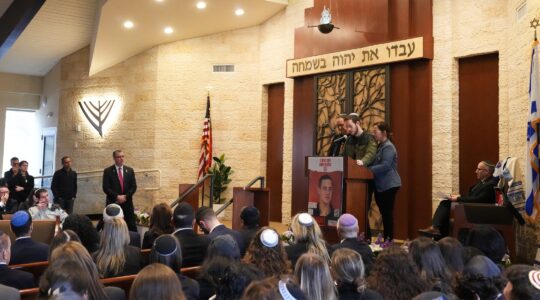JERUSALEM, Dec. 23 (JTA) — Thirteen Israelis were wounded, most of them lightly, after Hezbollah fired Katyusha rockets from Lebanon into northern Israel in a retaliatory attack for the deaths of seven Lebanese civilians. In response to the attacks, Prime Minister Benjamin Netanyahu convened his Inner Security Cabinet to discuss the situation and was due to tour the northern border later in the day. The attacks came a day after Israeli air strikes caused the deaths of the Lebanese civilians — a mother and six of her children. Israel has apologized for those deaths, which it called an accident, and Israeli Defense Minister Yitzhak Mordechai had sent a message to Syria and Lebanon warning against an escalation of hostilities. Netanyahu, after touring the areas that were hit, vowed that Israel would respond. Mordechai, who also toured the region, said the attack violated the understandings reached in the 1996 cease-fire that followed Operation Grapes of Wrath. “I said clearly yesterday that what happened was a mishap; there was no intent to hit civilians. But the purpose of the Hezbollah attack was to hit civilians,” he said. Most residents of northern Israel spent Tuesday night in bomb shelters. The state of alert continued on Wednesday, as schools were closed and residents allowed to leave shelters only to stock up on supplies. The army estimated that 20 to 30 rockets fell across the Galilee, causing property damage and bringing down electric lines. “I heard a huge boom, a number of huge booms,” Dahlia Misri told Israel Radio. “I knew it was very close to us. Glass flew everywhere, I was hurt in the hand. I lay on top of my son, because last time he was almost killed by the Katyusha rockets. Afterward, I got up and saw my house had been shattered to pieces.” The attack only further fueled the controversy over Israel’s 9-mile-wide security zone in southern Lebanon. Labor Knesset member Yossi Beilin, a leading advocate for an Israeli withdrawal from Lebanon, said Wednesday’s attacks were further proof that the security zone does not prevent attacks on northern Israel. Cabinet minister Rafael Eitan, meanwhile, pointed to the incident as a sign that Israel should widen the zone.
JTA has documented Jewish history in real-time for over a century. Keep our journalism strong by joining us in supporting independent, award-winning reporting.





